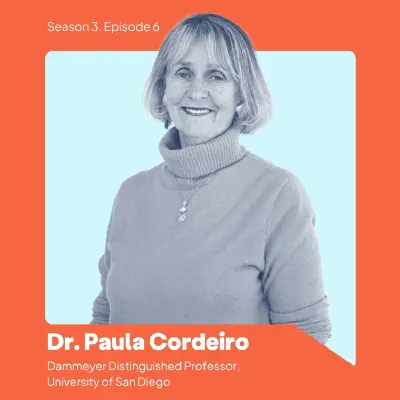Dr. Paula Cordeiro is a trailblazing educator, leadership expert, and social entrepreneur working at the intersection of business, nonprofits, and global development. A former dean and founder of the Nonprofit Institute at the University of San Diego, she’s reshaping how we think about leadership, wealth building, and the power of purpose-driven enterprises. Through programs like the Global Entrepreneurship Fellowship, she’s connecting San Diego to the world and bringing the best of global innovation home.
This Episode: What if nonprofits didn’t just serve communities but built wealth within them? And what if businesses weren’t just engines of profit but vehicles for social good?
Paula Cordeiro is championing a new model for leadership—one where empathy and equity are as important as profit margins. From food co-ops and employee-owned companies to certified B Corps and social enterprises, Paula sees a growing movement to blur the traditional lines between nonprofit and for-profit organizations. The goal? Create more sustainable, inclusive, and locally rooted economies.
In this conversation with Grant, Paula shares how her upbringing in a vibrant immigrant community shaped her worldview, how Mondragon, Spain, sparked her passion for co-ops, and why she believes San Diego can become a global hub for socially minded business innovation. She also reflects on the power of teaching empathy, and the opportunities to address wealth gaps.
Key Moments: [11:20] Defining social enterprise: people, profit, and planet [17:49] The evolving challenges facing nonprofit leaders today [23:43] The case for employee-owned businesses and generational wealth [31:16] How the Global Entrepreneurship Fellowship is building local and global bridges [43:27] Empathy as a core leadership trait—and how it can be taught
Key Terms:
Social Enterprise: A business—either nonprofit or for-profit—that exists to advance a social or environmental mission. These organizations prioritize impact alongside profit and often reinvest earnings into their mission.B Corporation (B Corp): A private company that has been certified by the nonprofit B Lab as meeting high standards of social and environmental performance, accountability, and transparency. Benefit Corporation: A legal business structure recognized in many U.S. states that allows companies to pursue both profit and a broader social purpose. Unlike B Corps, benefit corporations are not certified but are legally bound to consider their impact on society and the environment. ESOP (Employee Stock Ownership Plan): A program that gives workers ownership interest in the company. ESOPs are a way to build wealth for employees and create a more engaged workforce. Co-op (Cooperative): An organization or business owned and operated by a group of individuals for their mutual benefit. Co-ops can take many forms, such as food co-ops, housing co-ops, or worker-owned businesses.Resources Mentioned in This Episode:
Nonprofit Institute at University of San Diego – A hub for nonprofit leadership and research Mondragon Cooperative – A global model for employee-owned enterprises Pete Stavros TED Talk – A talk on rethinking corporate structures to expand who benefits from a thriving companyTake Action:
Explore Social Enterprise – Learn how your organization could blend mission with sustainability Support Employee Ownership – Advocate for inclusive business models in your community Invest in Empathy – Build leadership programs that teach listening, reflection, and care Learn from Global Models – Look to places like Rwanda, Spain, and beyond for innovative approaches to business and development Join the Conversation – Share this episode with nonprofit leaders, entrepreneurs, and changemakers ready to build a better way forward